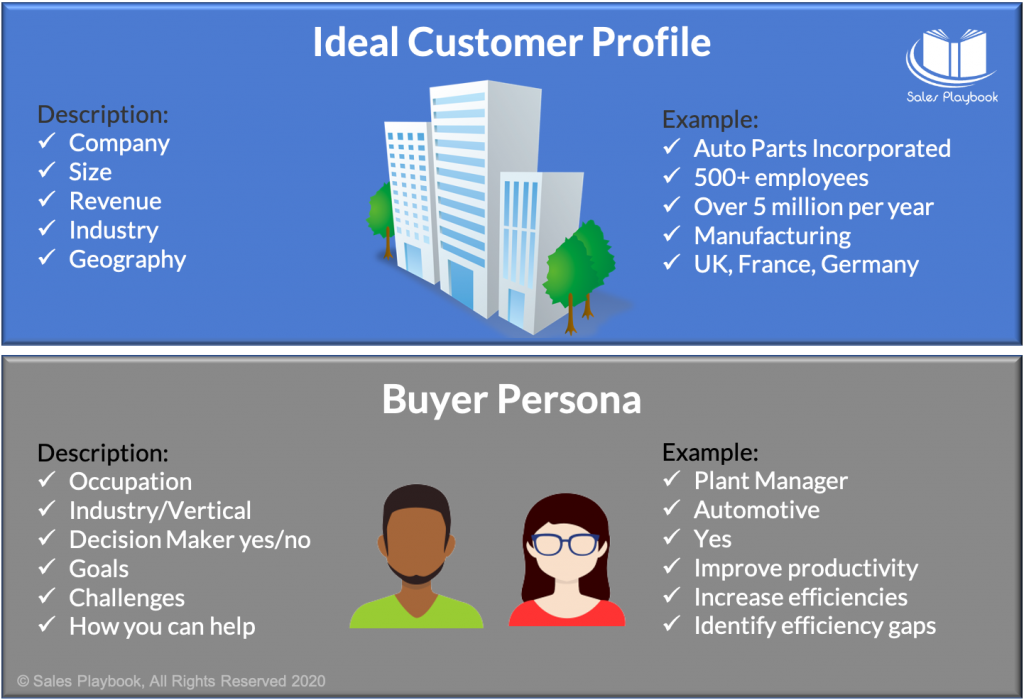
An ideal customer profile (ICP) is a semi fictional company that has all of the qualities you’re looking for that make them the best fit for the products or services you provide. In turn they also provide significant value for your organisation.
If your company clearly lays out what their ideal customer profile looks like it will enable you to supercharge growth by choosing which companies to do business with. It will also empower your sales team to target and spend their time with preferred future customers as opposed to ones that are less ideal.
Including your ideal customer profile in your company’s Sales Playbook is imperative as this will become a living, breathing definition of your target audience and as markets change, businesses evolve and job roles change so will the information in your ideal customer profile!
Ideal Customer Profile vs Buyer Persona
There seems to be some misconceptions around ICPs and buyer personas and the difference between the two, so I’ll explain these now. They’re both important to give guidance to your sales and marketing teams, but serve different purposes. A buyer persona should be included in your ideal customer profile so that your sales reps have clear guidelines around who they should be targeting. This information should be included in your company’s Sales Playbook.
But let’s break these two down to give clarity.
Ideal Customer Profile: This is a semi fictional company that you define as the perfect customer for what your organisation provides. Laying out specific elements like company size, revenue, industry, geography, etc will give your sales reps a tick list of what to look for during their prospecting efforts. By providing clear guidance on which businesses your sales team should be selecting will mean that they’re spending their valuable time on leads that have the highest chance of closing.
Buyer Persona: This is a semi fictional character within a given organisation that your sales or marketing team will target to discuss your products or services. For example this specific person could be a C-Level executive, marketing manager or project manager and in many cases will be broken down into decision maker, influencer and champion profiles.
Quite simply:
Ideal Customer Profile = The company
Buyer Persona = The person within that company

The Value of Having Ideal Customer Profiles
Your organisation may well have the ability to sell its products or services to a wide range of companies and it may even be of interest to a wide range of personas within those organisations, but having a well prepared ICP enables everyone to know where they can win!
If you sell your products or services to everyone you may see strong sales and high turnover in the short term, but in the long term it’s likely your company will see a high rate or churn with unhappy customers which would surely be detrimental to it’s long term goals. A well-defined ideal customer profile will provide steady revenue growth, but more importantly quality business growth with happy loyal customers that are keen to recommend you to others.
Along with the obvious long term revenue benefits your ideal customer profile(s) also help to build a strong relationship between your sales and marketing teams. Aligning these two teams around your unique selling proposition and the messaging of your products or services will mean both know exactly how and who they’re talking to, their efforts are in sync and your business will thrive.
Statistics show that ensuring your sales and marketing teams are aligned can increase customer retention rates by 36 percent and sales win rates by 38 percent. See below:
Your customer success and product development teams can also benefit from your ICP as they consider how to build and/or improve your offerings to better serve the needs of your customers over time.
The Value of Having Buyer Personas
Buyer personas help sales and marketing teams understand potential buyers. The strongest personas are based on market research as well as insights gathered from actual customers. By providing representations of who your teams will be interacting with, it makes it easier for them to tailor the content and messaging to that individual and increase the chances of a positive outcome.
Personas are given names such as “Marketing Manager Maggie”, “Product Manager Pete”, “CIO Craig” etc and by thinking of your personas as real people this allows you to craft your messages to speak to real people. Depending on your business, you could have as few as one or two personas, or as many as 15 to 20. The good news is you can add and remove personas as and when your buyer profiles change.
What should be included in your personas will really depend on your product or services and industry, but will normally include the following:
- Name
- Age Range
- Occupation
- Industry/Vertical
- Decision Maker yes/no
- Goals
- Challenges
- How you can help
- Messaging strategy
Buyer personas do not necessarily have to be long and in-depth, in many cases, especially if you’re creating a large number of profiles, it will be better to keep it short and sweet for each one as long as it includes the essential information
Four Core Benefits of Creating an ICP with Buyer Personas
1. Resources Focused on High Quality Leads
The more detailed the profile is the more strategic your sales and marketing efforts can be. By better identifying your ideal customer you will attract higher quality leads who are ready to buy.
2. Consistently Meet Sales Goals
By wasting less time and money pursuing wrong or less ideal leads, you can focus on understanding better how to reach and sell to the right prospects, which will mean more accurate forecasting, more closed-won deals and more growth.
3. Increased Customer Lifetime Value (CLV)
The better you know your ideal customer the better you can accommodate your offering to meet their needs. Having an ICP will allow you to provide the best possible customer experience and in turn reduce customer churn.
4. More referrals
Because ideal customers obtain real value from your product or service, they’re happy and happy customers are more likely to recommend your offerings to other potential customers.
In Conclusion
A clear definition of your ideal customer is an important part when creating your Sales Playbook. By giving your sales and marketing teams clear guidance of your preferred customers and then which personas to focus their engagement efforts on will help them to meet their sales goals more consistently, allow your business to focus your resources on targeting high quality leads, increase your CLV (Customer Lifetime Value) and get more referrals, all because you have identified the customers that will derive real value from your product or service.
People forget that you actually get to choose your customers, choose who you want to do business with, and if this is done correctly will not be limiting but empowering for any organisation!
“Know what your customers want most and what your company does best. Focus on where those two meet”
Thanks for reading. If you enjoyed this article please like below and share on your social channels.


